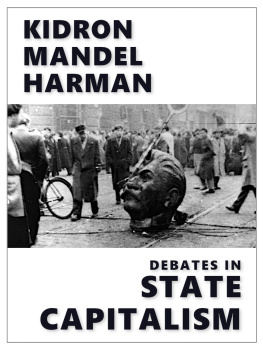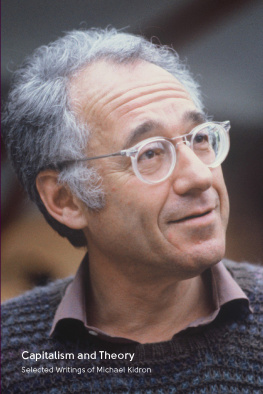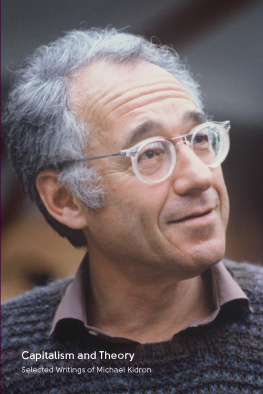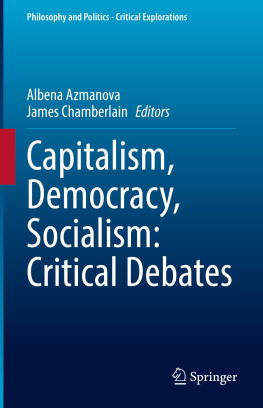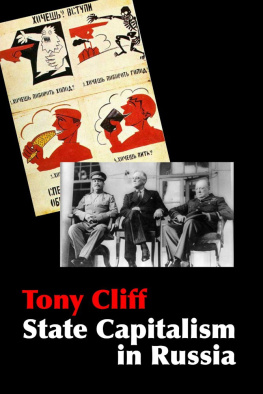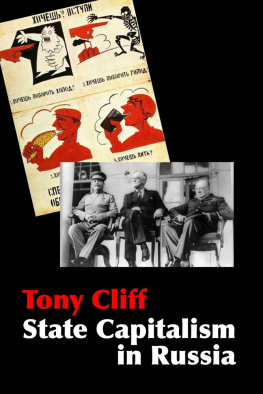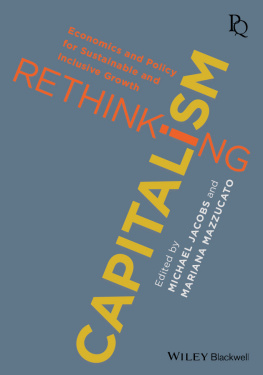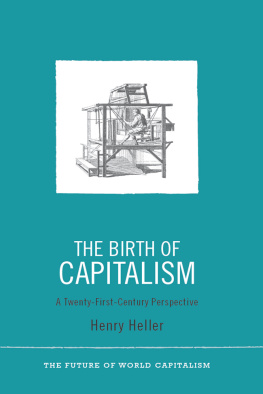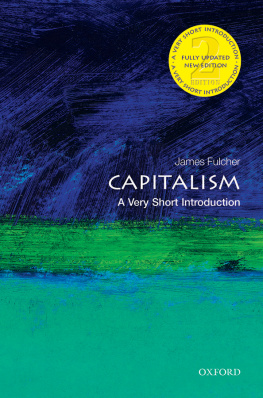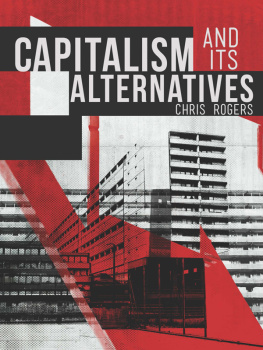Michael Kidron - Debates in State Capitalism
Here you can read online Michael Kidron - Debates in State Capitalism full text of the book (entire story) in english for free. Download pdf and epub, get meaning, cover and reviews about this ebook. year: 2020, publisher: Marxists Internet Archive, genre: Politics. Description of the work, (preface) as well as reviews are available. Best literature library LitArk.com created for fans of good reading and offers a wide selection of genres:
Romance novel
Science fiction
Adventure
Detective
Science
History
Home and family
Prose
Art
Politics
Computer
Non-fiction
Religion
Business
Children
Humor
Choose a favorite category and find really read worthwhile books. Enjoy immersion in the world of imagination, feel the emotions of the characters or learn something new for yourself, make an fascinating discovery.
- Book:Debates in State Capitalism
- Author:
- Publisher:Marxists Internet Archive
- Genre:
- Year:2020
- Rating:4 / 5
- Favourites:Add to favourites
- Your mark:
- 80
- 1
- 2
- 3
- 4
- 5
Debates in State Capitalism: summary, description and annotation
We offer to read an annotation, description, summary or preface (depends on what the author of the book "Debates in State Capitalism" wrote himself). If you haven't found the necessary information about the book — write in the comments, we will try to find it.
Debates in State Capitalism — read online for free the complete book (whole text) full work
Below is the text of the book, divided by pages. System saving the place of the last page read, allows you to conveniently read the book "Debates in State Capitalism" online for free, without having to search again every time where you left off. Put a bookmark, and you can go to the page where you finished reading at any time.
Font size:
Interval:
Bookmark:
Ernest Mandel
Chris Harman
International Socialism (1st series)1969-1970
International Socialism (2nd series)1990
Transcriptions by Einde OCallaghan, Roland Sheppard,
Christian Hgsbjerg, Gareth Jenkins, Jrn Andersen
Marked up by Einde OCallaghan and Roland Sheppard
for the Marxists Internet Archive
Converted to ebook format June 2020
Cover photograph: 1956 Hungarian Revolution
Wikimedia Commons
At the time of ebook conversion these articles were out of print.
International Socialism is available from:
http://isj.org.uk/
This ebook brings together debates in Marxist economic theory, particularly concerning the class nature of the Soviet Union, which took place in the pages of International Socialism in 1969 and 1990, and in a separate 1969 pamphlet.
The first debate was initiated by Michael Kidrons 1969 review of Ernest Mandels Marxist Economic Theory with a subsequent repsonse from Mandel in pamphlet form. Chris Harmans response to Mandels pamphlet followed the same year.
The second debate took place in 1990 following Chris Harmans review of Mandels Beyond Perestroika. The ensuing exchange between Mandel and Harman occupies a defining place in the debates surrounding the theory of State Capitalism.
Marxists Internet Archive
June 2020
Michael Kidron
Maginot Marxism: Mandels Economics
Ernest Mandel
The Inconsistencies of State-Capitalism
Chris Harman
The Inconsistencies of Ernest Mandel
Chris Harman
From Trotsky to State Capitalism
Ernest Mandel
A Theory Which Has Not Withstood the Test of Facts
Chris Harman
Criticism Which Does Not Withstand the Test of Logic
Maginot Marxism: Mandels Economics
(April 1969)
From International Socialism (1st series), No.36, April/May 1969, pp.33-36
Transcribed & marked up by Einde OCallaghan for the Marxists Internet Archive
Mandels Economics is a Marxist failure. It is unsure of the central capitalist dynamic. It evades the essentials of the system as it operates today. It is more concerned with defending Marxs categories of analysis than with applying them. In consequence, it does little damage to the system intellectually or, by derivation, in practice.
If capitalism is peculiar among class societies, it is not because a surplus product is systematically pumped from the mass of producers this happens in any class society nor because a small section of society, the ruling class organizes that pumping and benefits from it that too happens in any class society but because there is no central, public arrangement to ensure that the process will go on in an orderly, continuous and predictable way. Key choices about the deployment of resources are left to individual capitals, big and small, public and private.
Within nation states the doctrine of ultra vires holds, permitting individual capitals to do anything not expressly forbidden by laws whose scope and content they themselves determine to a large extent. Beyond, in the world shared between national capitals or the states with which they are more or less identified, positive constraints scarcely exist. Not even the largest state is coextensive with the system, so there are no overriding institutions that can make binding decisions for it. Yet a sort of order emerges from the chaos.
That it does so is because the behaviour of individual capitals is narrowly determined by the competition between them. Simply in order to exist over any length of time each capital must grow as fast as it possibly can, by reinvesting the major part of its share of surplus-value (accumulation) or by absorbing and taking over other, less successful capitals (concentration), or by doing both. If an individual capital did not grow, it would ultimately be unable to afford the rationalization and innovation with which to meet those that did, or unable to ride as successfully the sudden changes in market conditions which are part of the system. For an individual capital growth is the ultimate compulsion.
Growth does not come about automatically. Since capital is not a being but a systematic relationship between beings, somebody has to decide to make growth happen, to devote the freely-disposable resources as they become available to investment rather than consumption. That somebody, whether an individual or a group, must be able to measure its performance against very clear criteria. It must also be very strongly motivated to make the right decisions, for primordial Adam has still not been gorged, not even by affluent late capitalism.
The precise forms these criteria and incentives take are unimportant. Historically the former have been as different as the amount of money profits and the volume of gross physical output; and the latter as different as material privilege or superior status at one end of the spectrum, and material loss or physical punishment at the other. What is important is that the criteria measure consistently the contribution of an individual, or groups, decisions to the growth of any single capital; and that the incentives elicit as consistently the decisions that promote such growth.
This distinction between the behaviour of capital and the social and psychological mechanisms which ensure that behaviour, between the rules and the players of the game as it were, is obscured. It is nonetheless real, and of prime importance analytically. For the behaviour of capital its blind unconcerted compulsion to grow derives directly from the central peculiarity of the system its fragmentation into more or less autonomous competing units while the mechanisms whereby the ruling class organizes itself to promote that behaviour do not. These are common to all class societies.
The distinction does not exist for Mandel. On one page he concedes the accumulation of capital as the great driving force of capitalist society.
The primacy of growth is essential to Marxs model of the system at work. Each capital is driven to jack up productivity by coupling its workers with more, and more costly, machinery, while simultaneously trying to hold down wages. As this rationalization spreads, labour power becomes a smaller component of total capital (the organic composition of capital rises) and smaller even in absolute terms (the reserve army of labour grows); the value added in production and surplus value become smaller in relation to total investment; and so the average rate of profit falls. Booms become progressively less profitable and shorter; slumps more lasting and severe. Stagnation threatens and the system becomes increasingly restrictive.
The model is a closed system, in which all output flows back as inputs in the form of investment goods or of wage goods. There are no leaks.
Yet in principle a leak could insulate the compulsion to grow from its most important consequences. If labour-intensive goods were systematically drawn off, the overall organic composition of capital would rise faster than in a closed system. However, if capital-intensive goods were drawn off, the rise would be slower and depending on the volume and composition of the leak could even stop or be reversed. In such a case there would be no decline in the average rate of profit, no reason to expect increasingly severe slumps, and so on.
Capitalism has never formed a closed system in practice. Wars and slumps have destroyed immense quantities of output. Capital exports have diverted and frozen other quantities for long stretches of time.
Font size:
Interval:
Bookmark:
Similar books «Debates in State Capitalism»
Look at similar books to Debates in State Capitalism. We have selected literature similar in name and meaning in the hope of providing readers with more options to find new, interesting, not yet read works.
Discussion, reviews of the book Debates in State Capitalism and just readers' own opinions. Leave your comments, write what you think about the work, its meaning or the main characters. Specify what exactly you liked and what you didn't like, and why you think so.

